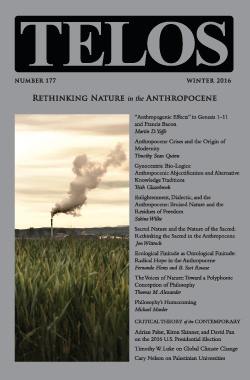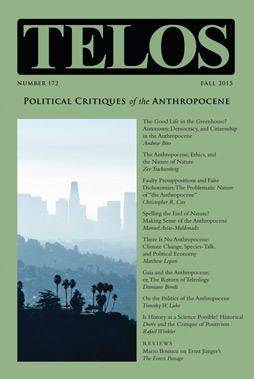The vulnerability we confront in the Anthropocene is what Jonathan Lear has called ontological vulnerability: the possible collapse of our world, that is, the collapse of the taken-for-granted way of life that guides and orients us in our everyday practices. In this paper, we take up Lear’s claim that in the face of the impending collapse of one’s world, a peculiar form of hope, radical hope, is called for. According Lear, radical hope means holding on to a “commitment only to the bare possibility that, from this disaster something good will emerge.”
Continue reading →
By Timothy Sean Quinn · Thursday, January 5, 2017 The term “Anthropocene” designates the present age of the world, dominated and transformed by human activity. It is therefore an age of crisis, whose central features include not only technological exploitation of the earth, but also a loss of faith in any order, natural or supernatural, that could serve as a guide to human affairs. In this essay, I wish to argue, first, that the roots of this crisis rest with the modern concept of nature, a concept of nature that, as Hans Jonas wrote, “contained manipulability at its theoretical core.”
Continue reading →
By Jon Wittrock and Richard Polt · Monday, December 12, 2016 Telos 177 (Winter 2016) is now available for purchase in our store.
 While the term Anthropocene was used in the USSR already in the 1960s to refer to the late Quaternary era, it rose to prominence more recently when introduced by Eugene F. Stoermer and Paul J. Crutzen. As the very word indicates, this is an epoch when humanity has taken center stage in the sense that its activities now have a major, global, and lethal impact. The shadow of human-caused global destruction and mass death haunts this epoch, and indeed, humanity’s newly acquired capacity for devastation is one of the Anthropocene’s most marked traits. While mass extinctions are hardly new phenomena and while the specter of the extinction of humanity due to some sudden catastrophe was there even before human beings were aware of it in scientific terms, the actual capacity of humanity to extinguish itself along with a large swath of other species on the planet is new, and the stakes of human action are higher. While the term Anthropocene was used in the USSR already in the 1960s to refer to the late Quaternary era, it rose to prominence more recently when introduced by Eugene F. Stoermer and Paul J. Crutzen. As the very word indicates, this is an epoch when humanity has taken center stage in the sense that its activities now have a major, global, and lethal impact. The shadow of human-caused global destruction and mass death haunts this epoch, and indeed, humanity’s newly acquired capacity for devastation is one of the Anthropocene’s most marked traits. While mass extinctions are hardly new phenomena and while the specter of the extinction of humanity due to some sudden catastrophe was there even before human beings were aware of it in scientific terms, the actual capacity of humanity to extinguish itself along with a large swath of other species on the planet is new, and the stakes of human action are higher.
Continue reading →
By Matthew Lepori · Tuesday, October 20, 2015  Anthropocene scholars push a new universal history and subject: we (the “anthropos”) are digging our grave as a species. Though this rhetoric is effective for drawing attention to the ecological crisis, the Anthropocene concept is dangerous for social theory. By generalizing responsibility and guilt for our contemporary ecological crisis to the point that it encompasses the human species, the concept and discourse elide the particular people and structures responsible for creating it. Rather than clarify the origins of the contemporary crisis—the history of capitalism, colonialism, and simplistic ideas about nature—it occludes them through forays into “deep history” and tales of technology disembedded from their social context. Lacking this history, the Anthropocene operates as an empty cosmopolitanism. Rather than provide a ground for a new political ecology, the Anthropocene removes it. Worse, the concept may prove useful for global actors who wish to hide their climate debts, using the rhetoric of collective responsibility that the Anthropocene makes possible. Anthropocene scholars push a new universal history and subject: we (the “anthropos”) are digging our grave as a species. Though this rhetoric is effective for drawing attention to the ecological crisis, the Anthropocene concept is dangerous for social theory. By generalizing responsibility and guilt for our contemporary ecological crisis to the point that it encompasses the human species, the concept and discourse elide the particular people and structures responsible for creating it. Rather than clarify the origins of the contemporary crisis—the history of capitalism, colonialism, and simplistic ideas about nature—it occludes them through forays into “deep history” and tales of technology disembedded from their social context. Lacking this history, the Anthropocene operates as an empty cosmopolitanism. Rather than provide a ground for a new political ecology, the Anthropocene removes it. Worse, the concept may prove useful for global actors who wish to hide their climate debts, using the rhetoric of collective responsibility that the Anthropocene makes possible.
Continue reading →
By Damiano Bondi · Thursday, October 15, 2015  The Gaia hypothesis was formulated for the first time in 1979 by James Lovelock. According to this conception, the Earth should be seen as a macro-organism whose purpose is to keep constant some conditions that are necessary for the presence of life on its surface. However—often with the consent of Lovelock himself—this scientific hypothesis has gone beyond its limits, transforming itself in a sort of anti-humanistic pseudo-religion: the Earth becomes a kind of divinity (Gaia) with a purposive will. This process of “personification” is quite paradoxical: Nature acquires features that are denied, at the same time, to the single man. In fact the human being, in this conceptual framework, is only a part of the Great Whole, the Mother Nature; he cannot be “her” guardian at all, he has to abandon any pretense of ontological superiority and to “believe” in the infinite potential of Gaia, who always finds a way to restore the threatened balance. On the ontological level, there is no difference between the single man and the natural ambient that surrounds him; so, on the moral level, this metaphysical conception ends to justify the indifference of the person to the impact of his own actions on the ecosystem. Not surprisingly, Lovelock has recently been deployed in favor of nuclear power. The Gaia hypothesis was formulated for the first time in 1979 by James Lovelock. According to this conception, the Earth should be seen as a macro-organism whose purpose is to keep constant some conditions that are necessary for the presence of life on its surface. However—often with the consent of Lovelock himself—this scientific hypothesis has gone beyond its limits, transforming itself in a sort of anti-humanistic pseudo-religion: the Earth becomes a kind of divinity (Gaia) with a purposive will. This process of “personification” is quite paradoxical: Nature acquires features that are denied, at the same time, to the single man. In fact the human being, in this conceptual framework, is only a part of the Great Whole, the Mother Nature; he cannot be “her” guardian at all, he has to abandon any pretense of ontological superiority and to “believe” in the infinite potential of Gaia, who always finds a way to restore the threatened balance. On the ontological level, there is no difference between the single man and the natural ambient that surrounds him; so, on the moral level, this metaphysical conception ends to justify the indifference of the person to the impact of his own actions on the ecosystem. Not surprisingly, Lovelock has recently been deployed in favor of nuclear power.
Continue reading →
By Christopher R. Cox · Monday, October 12, 2015  Critiques of the Anthropocene abound, but few adequately challenge the argument’s historical weaknesses. This essay is meant to engage them. The Anthropocene argument relies deeply upon the false dichotomy that human reality is not geological reality; that individual and collective human behaviors are of more importance than the systems in which those behaviors are manifested. The violent ontological notion that humans are extra-natural and nature is extra-human, the human/nature divide, set the stage long ago for the systemic exploitation and appropriation of nature. Unlimited accumulation of capital is a holographic-like reality, only plausible if humans are seen as the beneficiaries of nature’s “bounty,” and extra-human nature as the beneficiary of humanity’s waste. My argument unfolds in three pieces: First, these problematic ontologies are laid out and retreated with historical relationality. Second, I utilize some key theses from the work of Jason W. Moore to take seriously the notion that “nature” is not in fact ontologically divided from the human, but is always already co-constitutive of both the human and the extra-human. This framing allows us to see that carbon intensive social engines are only possible under specific organizational regimes of power. Capital, not the Anthropos, is at the heart of what the Anthropocene is most concerned about, carbon, and therefore the Anthropocene is a misnomer. It is in this sense that I argue, in solidarity with Moore and others, that this new epoch we have entered is more aptly called the Capitalocene. Critiques of the Anthropocene abound, but few adequately challenge the argument’s historical weaknesses. This essay is meant to engage them. The Anthropocene argument relies deeply upon the false dichotomy that human reality is not geological reality; that individual and collective human behaviors are of more importance than the systems in which those behaviors are manifested. The violent ontological notion that humans are extra-natural and nature is extra-human, the human/nature divide, set the stage long ago for the systemic exploitation and appropriation of nature. Unlimited accumulation of capital is a holographic-like reality, only plausible if humans are seen as the beneficiaries of nature’s “bounty,” and extra-human nature as the beneficiary of humanity’s waste. My argument unfolds in three pieces: First, these problematic ontologies are laid out and retreated with historical relationality. Second, I utilize some key theses from the work of Jason W. Moore to take seriously the notion that “nature” is not in fact ontologically divided from the human, but is always already co-constitutive of both the human and the extra-human. This framing allows us to see that carbon intensive social engines are only possible under specific organizational regimes of power. Capital, not the Anthropos, is at the heart of what the Anthropocene is most concerned about, carbon, and therefore the Anthropocene is a misnomer. It is in this sense that I argue, in solidarity with Moore and others, that this new epoch we have entered is more aptly called the Capitalocene.
Continue reading →
|
|









